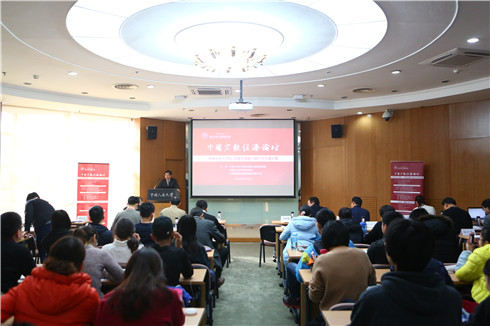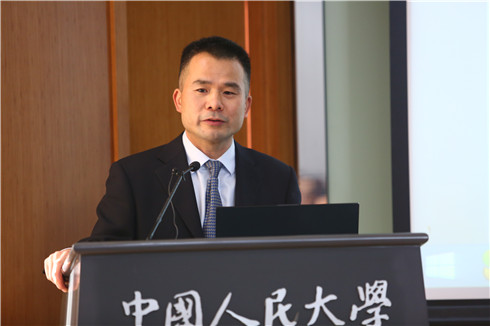 Research Update
Research Update
05
December

On December 4, 2016, the “China Macro Economy Forum” Symposium, jointly organized by National Academy of Development and Strategy, School of Economics, Renmin University of China (RUC), and China Chengxin Credit Management Co., Ltd. was held in RUC. At the symposium, the research group released the research report on“Roadmap for Reform of China’s Central-Local Government Relations”.
Present were experts and scholars including Wang Daoshu, Inspector of Revenue Planning and Accounting Department, State Administration of Taxation, Liu Shangxi, Secretary of the Party Committee and President of Chinese Academy of Fiscal Sciences (CAFS), Gao Peiyong, Commissioner of Academic Division of Chinese Academy of Social Sciences (CASS) and President of National Academy of Economic Strategy, CASS, Qiao Baoyun, President of China Academy of Public Finance and Public Policy, Central University of Finance and Economics, Guo Qingwang, Dean of School of Finance, RUC and Liu Fengliang, Executive Deputy Dean of Graduate School, RUC and Director of Human Resource Department.

Prof. Zheng Xinye, Researcher of NADS, RUC and Deputy Dean of School of Economics, RUC, introduced findings in the report on behalf of the research group. According to the report, global practice and research indicate that it is hard to say that there is an invariable and universally applicable mode of central-local government relations. Difference in economic system and economic development level, change in main tasks and objectives of society in a specific period and even difference in ethnic composition will affect government size, combination of functions and central-local government relations. Within an economy, change in people’s demand for public services and public financing mode over time will also cause adjustment to central-local government relations.
China’s fiscal system has undergone several great changes: centralized unified collection and allocation of funds--fiscal responsibility system featured by decentralization of administrative power--tax distribution system featured by decentralization of economic power. In the context of urgent adjustment to supply-demand gap and great production pressure, comparatively low tax burden level, growth-supporting fiscal revenue and expenditure structure, more powers and expenditures borne by local governments are rational arrangements. Compared with that in the past, the situation of China’s current fiscal system has undergone profound changes. Firstly, main problem of economic development has changed from insufficient supply to insufficient demand. As China’s economy is further integrated into the global economic system, economic fluctuations in other countries and regions worldwide are more easily transmitted to China. Secondly, in the process of rapid economic growth, China is witnessing increasingly serious social unfairness, which manifests as evolution of China from a society featured by comparatively equal income to an economy featured by highly unequal income distribution, with increasingly serious regional differentiation in social security and fiscal resources as well as wider gap in regional economic and social development. Thirdly, the ability to supply public goods is to be improved, so as to satisfy the increasing social demands. In addition to public services such as education and healthcare to be urgently improved, a main negative consequence of rapid economic and social development is serious environmental pollution. These changes require new change in the fiscal system and whilst promoting economic growth, consideration should also be given to preventing and controlling economic fluctuations, improving social fairness (including income distribution and social security) and supply of public goods (including supply of public goods, prevention and control of environmental pollution), etc., so as to serve the overall development of the country.
In the process of the reform of China’s fiscal system, central finance becomes gradually less important, embodied as decrease in proportions of central financial income and expenditure in the context of “Big Finance”. China’s fiscal system is faced with the transformation from the one focusing on promotion of economic growth to that balancing economic growth, economic fluctuations, social fairness and supply of public goods. But report findings indicate that the current fiscal system has made limited contributions to realization of the four objectives while decentralization of fiscal power shows uncertain effects on economic growth, economic fluctuations, social fairness and supply of public goods.
1. With respect to promotion of economic growth, taxation, mainly added-value tax, exerts few influence on distorting capital formation and labor supply when raising public funds; while public expenditure, in which infrastructure investment accounts for a large proportion, provides strong support for economic growth. However, studies on effects of decentralization of fiscal power on economic growth have not yet reached a unanimous conclusion. Recent studies show that decentralization of fiscal power has inverted uU-shaped effects on economic growth.
2. With respect to prevention and control of economic fluctuations, since income tax and unemployment insurance, as automatic stabilizers, account for a small proportion in tax revenue and fiscal expenditure respectively, and local fiscal deficit arrangement is restricted, China’s current fiscal system plays a limited role.
3. With respect to promotion of social fairness, the current fiscal system performs poorly in improving residents’ income distribution, providing social security and narrowing local development gap. In respect of income distribution, income tax that reduces the income of the rich and social relief expenditure for the poor accounts for a low proportion in income structure and social expenditure structure respectively, limiting the governmental role in improving residents’ income distribution; in respect of social security, local governments bear most expenditures, but different areas show different basic fiscal resources and different demands for social insurance, social relief and pension, so that various dimensions of social security are fragmented; additionally, in respect of arrangement of fiscal resources, as central and local governments are subject to unclear powers and responsibilities, the goal of improved public welfare through social security can hardly be met. Regionally, research shows that decentralization of fiscal power will lead to differentiation of fiscal resources in different regions, have no obvious effects on narrowing urban-rural income gap and worsen inequality of regional development.
4. With respect to supply of public goods, decentralization of fiscal power is considered as being helpful for increasing the efficiency of public goods supply by local governments and improving social welfare. However, in respect of control of environmental pollution, there is no differential tax rate set up in the current added-value tax according to pollution load, public sectors have not made obvious contributions, and decentralization of fiscal power will even worsen environmental quality.
In order to balance the four objectives above, during the “13th Five-Year-Plan” period, adjustment to the reform of fiscal system should be made in terms of total quantity, structure and central-local government relations. Firstly, with respect to total quantity, the government size should be maintained. In view of the fact that fiscal deficit is still at a low level and such deficit has few adverse impacts on interest rates, there is still great room for China to use fiscal deficit. Besides, during economic fluctuations, funds required by the government to deal with economic decline should be borne by fiscal deficit.
Secondly, income structure adjustment should be the top priority of fiscal system reform during the “13th Five-Year-Plan” period. With respect to income structure, efforts should be made to improve corporate income tax and individual income tax collection systems and increase the proportion of the two taxes in government revenue, allowing the automatic stabilizer to more effectively prevent economic fluctuations and providing macro-control tools for control of economic fluctuations. The two taxes are also important tools with which the government can improve income distribution. Additionally, differential tax rates should be implemented: tax rate of some carbon-contained products should be raised to 30% while tax rate of other products should be lowered to 9%, so that added-value tax rates will be reset to promote environmental improvement by means of taxation. Moreover, in order to improve income distribution, inheritance tax and gift tax should also be set up.
Thirdly, with respect to expenditure structure, emphasis should be laid on adjustment to unemployment insurance system, so that income distribution will be improved whilst stabilizing economy. Therefore, as an important part of automatic stabilizers, the proportion of unemployment insurance expenditure in GDP should be raised from 0.07% during the “11th Five-Year-Plan” period to 0.5% during the “13th Five-Year-Plan” period. In addition, efforts should be made to drastically increase the proportion of social relief expenditure, mainly urban and rural minimum subsistence allowances, in fiscal expenditure.
Fourthly, central-local fiscal relations should be profoundly adjusted. In order for taxation and expenditure to become effective macro-control tools, corporate and individual income taxes have to be in the charge of the Central Government, and simultaneously a nationally unified medical insurance, unemployment insurance and social relief system in the charge of the Central Government should be established to realize the transformation of the role of the Central Government from a policy maker to a public service provider.
Participants had in-depth discussions and comments centering on the reversal of central-local government relations, expressed their respective opinions and put forward targeted policy suggestions.